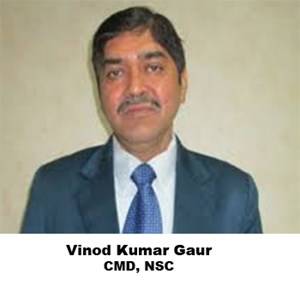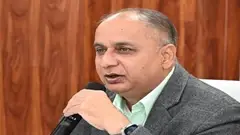
Seed is a critical and basic input for attaining higher crop yields and sustained growth in agricultural production. Distribution of assured quality seed is as critical as the production of such seeds. Unfortunately, good quality seeds are out of reach of the majority of farmers, especially small and marginal farmers mainly because of exorbitant prices of better seeds. In order to solve this problem, the Government of India established the National Seeds Corporation (NSC) in 1963 and the State Farmers Corporation of India (SFCI) in 1969. Thirteen State Seed Corporations (SSCs) were also established to augment the supply of improved seeds to the farmers.
The Indian seed industry had exhibited impressive growth in the past and is expected to provide further potential for growth in agricultural production: The role of seed industry is not only to produce adequate quantity of quality seeds but also to achieve varietal diversity to suit various agro-climatic zones of the country. The policy statements are designed towards making available to the Indian farmer, adequate quantities of seed of superior quality at the appropriate time and place and at an affordable price so as to meet the country’s food and nutritional security goals.
Indian seeds programme largely adheres to limited generation system for seed multiplication. The system recognizes three kinds of generation, namely breeder, foundation and certified seeds. Breeder seed is the basic seed and first stage in seed production. Foundation seed is the second stage in seed production chain and is the progeny of breeder seed. The Agriculture World Team had an interaction with Shri Vinod Kumar Gaur, Chairman cum Managing Director of the National Seeds Corporation Limited (NSC), a Government of India Undertaking `Mini Ratna` Company, who spoke about the Seed scenario with a public sector view point.
How NSC is able to compete with the other players in the market in the 600 varieties of seeds?
NSC has strong presence of high volume low value segment to fulfill the needs of all classes of farmers. With large number of varieties, NSC can compete with other players having large quantum of certified seeds available at reasonable prices which cater to the need of farmers. State Seeds Corporations are also doing the business on similar lines but with estimated number of products and they alone are not able to fulfill the requirement of their own state. NSC with large products occupies the position of one stop shop for seeds which farmers prefer to meet their all requirement from our place.
What is the business mantra of NSC creating bonding with the Indian Farmer?
The business mantra of NSC creating bonding with Indian farmers lies in its visit which aims prosperity of farming community. NSC’s activities of seed production through grower’s farmers are the first step in bonding with farmers. A faith is developed among farmers regarding quality assurance by NSC’s long presence since 1963. A large quantum of certified seed produced through at farms of NSC and such grower farmers is sold to the farmers at reasonable sale price in market through dealers net work and also under various schemes of Government of India for the benefit of farmers.
Any Innovations, improvisation NSC is involved for improvement in view of the Global Completion?
There is no scenario of competition. Seed Act provision surety for farmers to take seed available from any place in the world which is beneficial for him. NSC deals mainly open and close pollinated variety and hybrids mainly developed by National Agriculture Research Management system which includes ICAR Institute and Agricultural Universities.
Open pollinated seeds are also in great demand and mainly available even these seeds which are very important for food and nutritional security is not a small job. In order to streamline this, Government of India has recently merged another Corporation State Farms Corporation of India (SFCI) with NSC from 1.4.2014 with this about 22000 ha. Farms have become available with NSC which will help in preparation of breeder and foundation seeds required for multiplication of certified seeds. Farms are also working as production stations for Test Stock and this breeder seed become available to NSC at least one year in advance and with the release of variety, NSC is able to bring the seed in the market. NSC is tying up with multinational companies for their product and processing products are sold through NSC channels. As such, a situation of complementing and supplementing exists instead of going into competition.
NSC`s market share in the seed market in view of other private manufacturers of seeds?
In the recent past, Government of India has encouraged private sector in production and distribution of seed at local level. In all 500 small and medium seed companies are working in Indi. Still Corporation is able to maintain 5% share in the seed market in India.
a) NSC aims to structurally strengthen its farms by developing irrigation systems bring more land under cultivate to ensure sound and healthy seed production of breeder and foundation stages to9 support certified seed production programme.
b) NSC plans to venture in Agri. tourism concept at few farms and also popularize beneficial farming options for small land holders.
c) NSC plans to undertake production and marketing to a level of 25 lakh qtls. which is presently at 16-17 lakh qtls. and reach a level of 7% in 2 years and 10% shall in next 5 years.
What are the threats you are tackling in the business of the seeds?
The threats in tackling in the business of seeds are:
a. Initiation of private sector into high volume low value segment and persistent demand for subsidy eligibility.
b. Seed procurement by State Government through tender system from seed companies not having adequate resources for quality seed production.
c. Preferential treatment of State Seed Corporation by respective State Government and stoppage of subsidy centrally to NSC under some of the schemes.
What about quality maintenance of seeds?
The quality maintenance of seeds is the basic emphasis of NSC. With the own farms, NSC would be able to maintain quality of breeder and foundation seed, which are the root cause of quality deterioration which producing certified seeds. The quality of certified seed is maintained at every stage right from sowing to processing and packing. Large technical manpower with expertise in seed production and long experience in the seed industry is available with NSC particularly in quality seed production. Over and above, 99% of seed is produced under trial produced under third party certification system whose officer s of seed certifications agencies also supervise quality of different production and seed preposition.
Up till now NSC has not opted for ISO certification, Why?
It has opted long back ISO 9001:2008 and 14001:2014.
Any CSR activities of NSC for the benefit of the Farming Community?
CSR activities are being carried out for the benefits of farming community like planting of trees in rural areas, constructions of village road, schools etc. and assuring drinking water in rural areas for rural children.
What are the future plans of NSC in view of seeds as well as farming community?
Keeping in view of change in scenario from the variety of hybrids, NSC plan is to increase seed production of Maize, Sorghum, Bajra and vegetables besides production through MoU partners in order to cater the need of farming community.
1. It is decided to switch over to the newer variety in all major crops in a gradual manner with reduction in production of older varieties specially in crops like paddy, wheat, groundnut, pulses etc.
2. Launching of project for intensification of marketing activity and NSC brand promotion.
3. Business opportunities is explored in States where State Seeds Corporations are either not established or in infancy stage.
4. Business opportunities in North Eastern States under BGREI.
5. Entry into BT. Cotton segment.
6. Organizing large scale demonstration of the newer varieties to popularize the same among the farmers to enhance acceptability of the seeds of newer varieties.
7. Enhancing the seed production, processing and marketing by expanding growers net work and through PPP.
8. Providing training/extension and other seed related services to the farmers.
9. Erection of solar power fencing at farms to safeguard the crops from wild animals.
10. Establishment of Fodder Block Making Unit.
11. Establishment of Micro Irrigation Systems (Central Pivotal System, Sprinkler, Jet System, Drip Irrigation).















Share your comments